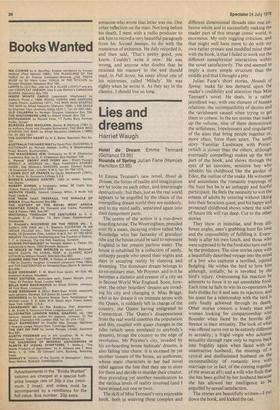Lies and dreams
Harriet Waugh Hotel de Dream Emma Tennant (Gollancz £3.95) Hounds of Spring Julian Fane (Hamish Hamilton £3.95)
In Emma Tennant's new novel, Hotel de Dream, the forces of reality and imagination are let loose on each other, and intermingle destructively ; but then, just as the real world appears to be engulfed by the chaos of the overspilling dream world they are suddenly, and to my mind sadly, separated again into their component parts.
The centre of the action is a run-down boarding house, The Westringham, presided over by a mean, decaying widow called Mrs Routledge who has fantasies of grandeur (she and the house could be said to represent England in her present parlous state). The house is inhabited by a collection of seedy, unhappy people who spend their nights and days in escaping reality by sleeping and dreaming. The dominant dream belongs to an ex-military man, Mr Poynter, and in it he becomes a dictator and creator of a city set in Second World War England. Soon, however, the other boarders' dreams are invading his city and changing it. Miss Briggs, who in her dream is on intimate terms with the Queen, is suddenly left in charge of the country, the Queen having emigrated to Connecticut. The Queen's disappearance from the real world unsettles the population and this, coupled with queer changes in the tides (which seem unrelated to anybody's dreams), brings the country to the edge of revolution. Mr Poynter's city, invaded by his co-boarding house habitués' dreams, is also falling into chaos: it is stormed by yet another inmate of the house, an authoress, whose main characters in her bad novel rebel against the fate that they see in store for them and decide to murder their creator, thus providing yet another ramification to the various levels of reality involved (and I have missed out one or two).
The skill of Miss Tennant's very enjoyable book, both in weaving these complex and
different dimensional threads into one cohesive whole and in successfully making the reader part of this strange comic world, is enormous. My only niggling criticism, and that might well have more to do with mY own rather prosaic and muddled mind than with the book, is that I failed to work out the different metaphysical interactions within the novel satisfactorily. The end seemed to imply a more simple structure than the middle and that I thought a pity.
Julian Fane's short stories, Hounds of Spring, make far less demand upon the reader's credibility and attention than Miss Tennant's novel. He deals, in a rather jaundiced way, with one element of human relations: the incompatibility of desires and the ravishment caused when trying to get them to cohere. In the ten stories that make up the volume, nine of them demonstrate the selfishness, hopelessness and singularity of the aims that bring people together or, more often, force them apart. The tenth story 'Familiar Landscape with Ponies' (which is slower than the others, although eventually compelling) makes up the first part of the book, and shows through the eyes of 'an innocent, sensitive boy who inhabits his childhood like the garden of Eden, the outline of the snake. He witnesses and assimilates the romantic trappings of the hunt but he is an unhappy and fearful participant. He feels the necessity to win the esteem of adults by entering without liking into their ferocious quest, and his happy and protected childhood shows where the scars of future life will run deep. Cut to the other stories.
They show in minutiae, and from different angles, man's grabbing hunt for love and the impossibility of fulfilling it. Everybody is after his own lunch, and those who were supposed to be the food also turn out to be the predators. The nine stories open with a beautifully described voyage into the mind of a boy who captures a terrified, injured fledgling. He wishes the bird to love him although, initially, he is revolted by the bird's injury. Overcoming his reaction he attempts to force it to eat unsuitable food. Each time he fails to in its co-operation he feels dislike for it and sees its rejection, and his quest for a relationship with the bird is only finally achieved through its death. Other stories concern a lonely man and woman looking for companionship who flounder when faced by the horrific difference in their sexuality. The look of what was offered turns out to be entirely different in actuality; a 'frigid virgin who achieves sexuality through rape only to regress back into frigidity again when faced with all unattractive husband; the musings of 3 cynical and disillusioned husband on the incompatibility of romantic love with marriage (or in fact, of the coming together of the sexes at all); and a wife who finds that she has been gulled by her husband because she has allowed her intelligence to be engulfed by sexual satisfaction.
The stories are beautifully written—I pat down the book, and kicked the cat.


































 Previous page
Previous page